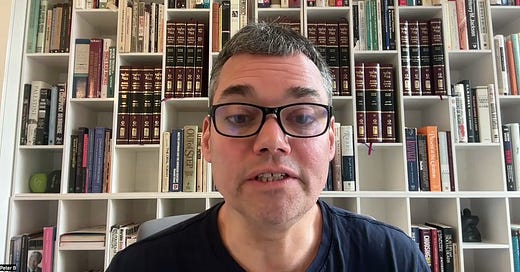For the foreseeable future, our Zoom calls will be moving to a new time: Friday at 11 AM Eastern.
Our guest this week is someone I admire greatly, Tel Aviv University History Professor Yael Sternhell. We’ll talk about repression in Israeli academia following the arrest of Palestinian legal scholar Nadera Shalhoub-Kevorkian, who teaches at Hebrew University. We’ll also talk about Israeli discourse about the Gaza War and the response in Israel to protests in the US. As an Israeli who is also a historian of the United States, Sternhell is uniquely positioned to discuss the way each country understands the other at this terrible and historic moment.
Paid subscribers will get the link this Monday and the video the following week. They’ll also gain access to our library of past Zoom interviews with guests like Rashid Khalidi, Thomas Friedman, Ilhan Omar, Benny Morris, Noam Chomsky, and Bret Stephens.
Sources Cited in this Video
Israel returns to fight in places where it claimed Hamas was defeated.
Things to Read
(Maybe this should be obvious, but I link to articles and videos I find provocative and significant, not necessarily ones I entirely agree with.)
In the Jewish Currents (subscribe!), Zvi Ben-Dor Benite talks to Avi Shlaim about his family’s journey from Iraq and what it means to be an Arab Jew.
Like so many people with family in Gaza, the political analyst Khalil Sayegh has endured unthinkable agony since this war began. He’s seen his father and sister killed. He’s trying to bring his remaining family members to safety. If you can help, please do.
Last week’s link to the latest edition of The Ideas Letter, which includes essays on Gaza and its reverberations by Mark Mazower, Chris Ngwodo, and Daniel Levy, didn’t work. Here’s the correct one.
Rick Perlstein on how the current campus protests—and the repression they elicit—aren’t like the protests of the 1960s.
The mother of Hind Rajab talks about students naming a building at Columbia University after her daughter.
Hard to believe this appeared on Fox News.
Hadas Thier in The Nation on whether the encampments threaten Jewish students.
In last week’s video, while rebutting the claim that today’s protesters are privileged and narcissistic, I incorrectly suggested that anti-Vietnam protesters were motivated by self-interest because they were trying to avoid the draft. A number of protesters from that era registered their displeasure. I’m reprinting part of an email from subscriber Merrill Goozner, who rightly takes me to task.
“The earliest protests led by SDS [Students for a Democratic Society] in 1965 called attention to the horrific slaughter of innocent civilians (pro-Viet Cong, perhaps, but non-combatants nonetheless). That’s the direct correlation to today’s situation in Gaza, which has sparked similar protests. By the most conservative estimates, non-combatants totaled more than a half million of the 1.3 million who died during the war. As someone who came of age during that era and participated in the antiwar movement, I can assure you that moral outrage of what was being done ‘in our name,’ and the betrayal of the nation’s ideals that the war represented, played a much larger role in motivating the era’s antiwar students than fear of the draft.
Moreover, there was a widespread recognition among antiwar activists that the draft and its student deferment were egregiously unfair, represented by the slogan, ‘Rich Man’s War, Poor Man’s Fight.’ The draft resistance movement (I have a close friend who refused to register and went to jail) consistently called attention to this inequity.
I know plenty of people who found a doctor to write up a phony excuse to get out of the draft during that era. This was especially prevalent after the Tet offensive when public opinion turned against the war. But I would argue that even this behavior, for most, was because they believed that participation in the war was immoral and senseless.”
See you on Friday at 11 AM,
Peter
VIDEO TRANSCRIPT:
This will come out on Monday, which is Yom HaZikaron in Israel. It’s Israel’s Memorial Day. It’s always a very painful day in Israel when Israelis mourn their dead from war. But it will be immensely painful this year because Israelis will be thinking about the people killed on October 7th, and indeed the Israelis who are still held hostage. And I think it will be even worse because it seems increasingly clear to me that this war in Gaza is nowhere near an end, and that tragically Israeli soldiers are going to continue to die in Gaza and be mourned on future Yom HaZikarons. And that this was very predictable.
And I wanna read something from The New York Times from yesterday. They write, ‘close-quarters ground combat between Hamas fighters and Israeli troops raged in parts of northern Gaza over the weekend. The fighting fit into a now-familiar scenario. Israeli forces returning to an area where they had defeated Hamas earlier in the war, only to see the group reconstitute in the power vacuum left behind.’ This kind of thing will be very familiar to Americans who remember our wars in Iraq and Afghanistan, and indeed in Vietnam, where Americans were told that the United States had cleared out entire swaths of territory where it defeated the enemy, only to find that the enemy was still there, and the United States needed to return again and again.
So, we were told also that Israel had defeated Hamas everywhere in Gaza except for this little corner in the south, in Rafah, and it just needed to go in there and defeat the last few Hamas units, and then Hamas would be defeated. And we now see that that’s a lie. And it’s a lie for the same reason it was a lie in Iraq and Afghanistan and Vietnam because countries with powerful armies like Israel and United States can topple governments, but they cannot defeat insurgencies unless they offer a solution to the underlying fundamental political grievance of the population. And this Israeli government has not even tried to pretend that it is offering a solution to the fundamental grievance of the Palestinian people in Gaza and beyond, which is their lack of freedom. And so, absent that, Israel can’t marginalize Hamas. And even if it could somehow miraculously marginalize or even defeat Hamas, it would simply face another resistance force that was just as dangerous.
Of course, what Hamas did on October 7th was horrifying. But Palestinians had been fighting Israel in a whole range of ways, including violence against Israeli civilians, since long before Hamas existed. And so, saying that you are going to make Israel safe by defeating Hamas without dealing with the underlying problem of Palestinian lack of freedom is a little bit like when Israel thought that it could solve its problem in the early 1980s by kicking the PLO out of southern Lebanon. And it did expel the PLO from southern Lebanon, and it laid waste to much of Lebanon, and it laid the foundation for Hezbollah, which is an even more formidable foe. We know that Hamas recruits its fighters from the families of people Israel has killed. Presumably, any other Palestinian resistance group would do the same thing.
And so, now that Israel has killed 40,000 or so Palestinians, forced 90% of Palestinians in Gaza from their homes, the population of people that will be easy recruits for future attacks against Israel is that much greater than it was before. And so, Israel is less safe. And this war, it seems to me, is likely to drag on for a very, very long time, leaving more and more Palestinians devastated in the more Israelis endangered and dead. And what’s so depressing to me is that this was predictable. Indeed, this was predicted. And the people who predicted it most clearly, not coincidentally, were Palestinians who have been saying from the very beginning that Israel’s fundamental problem is not with Hamas, it’s with the Palestinian people, and that Israel has to offer a solution to that fundamental problem.
And yet, their voices have been—as so often has been the case in the United States—marginalized in American politics and in American media, certainly marginalized in Israel, where it’s rare to hear Palestinian voices on Israeli TV; where Israel’s own Palestinian citizens who oppose this war—if you look at public opinion, who could have been the wisest counsel for Israeli political leaders—have been basically terrified into silence because of Israeli repression. And so, this kind of blind fury that you’ve had in Israel after October 7th—abetted by the United States, which so resembles the mood in the United States after 9/11—has marginalized the voices that could have offered the wisest counsel about how to respond.
So, what do we see in the United States? We see that many, many people who supported the Iraq War have very high-profile positions and platforms in discussions about the war in Gaza. But Palestinians who know Gaza and Palestinian politics the best don’t have a voice. It reminds me so much of the debate in the United States after September 11th when there were so few people who really knew Iraq and Afghanistan well who were part of that public discussion, who could have warned Americans about the likely impact of those wars on those societies and the inability of America to win those wars.
And to me, it sometimes feels like when I listen to American Jewish and Israeli Jewish discourse, that like I’m part of this family. And our family is doing immensely destructive things to other people. Of course, we’ve been very badly wounded ourselves, but we’re responding by doing these immensely destructive things to other people. But those things are also self-destructive to us as well. And that there are voices that we could listen to that could help perhaps get us out of this downward spiral. In this case, particularly to listen to Palestinians because Palestinians know better than anybody else what it will take to get Palestinians to stop fighting against Israel. And Palestinians have been saying again and again and again that Israeli Jews will not be safe if the Palestinians are not safe. And Palestinians can’t be safe unless they’re free.
And those voices, I believe, could get us out of this terrible downward spiral. And yet, they are systematically excluded from our discourse. And I listen again and again and again to very, very smart people in my community who have public platforms in politics, in media discussing this issue. And I think: these people are very, very smart. Why hasn’t it occurred to them to bring in Palestinian voices onto their platforms, and ask Palestinians what they think the solution to Israeli safety is? And because Palestinians are not part of that conversation, I feel like we are in this downward spiral, not only in terms of the horrors that we commit and that Israel commits against Palestinians, but indeed the way that contributes to less and less safety for Israeli Jews.
The wars in Iraq and Afghanistan left America in so much worse shape in so many ways. And when you think about what this war in Gaza will mean for Israel, given that Israel is not half a world away from the territories that it is devastating, and in which it’s producing all of these enraged people who want to fight back, but that it actually lives cheek by jowl with those people, it really terrifies me the consequences of this war, and frustrates me a great deal that the voices who might have warned, indeed did warn against this path, were not listened to.










